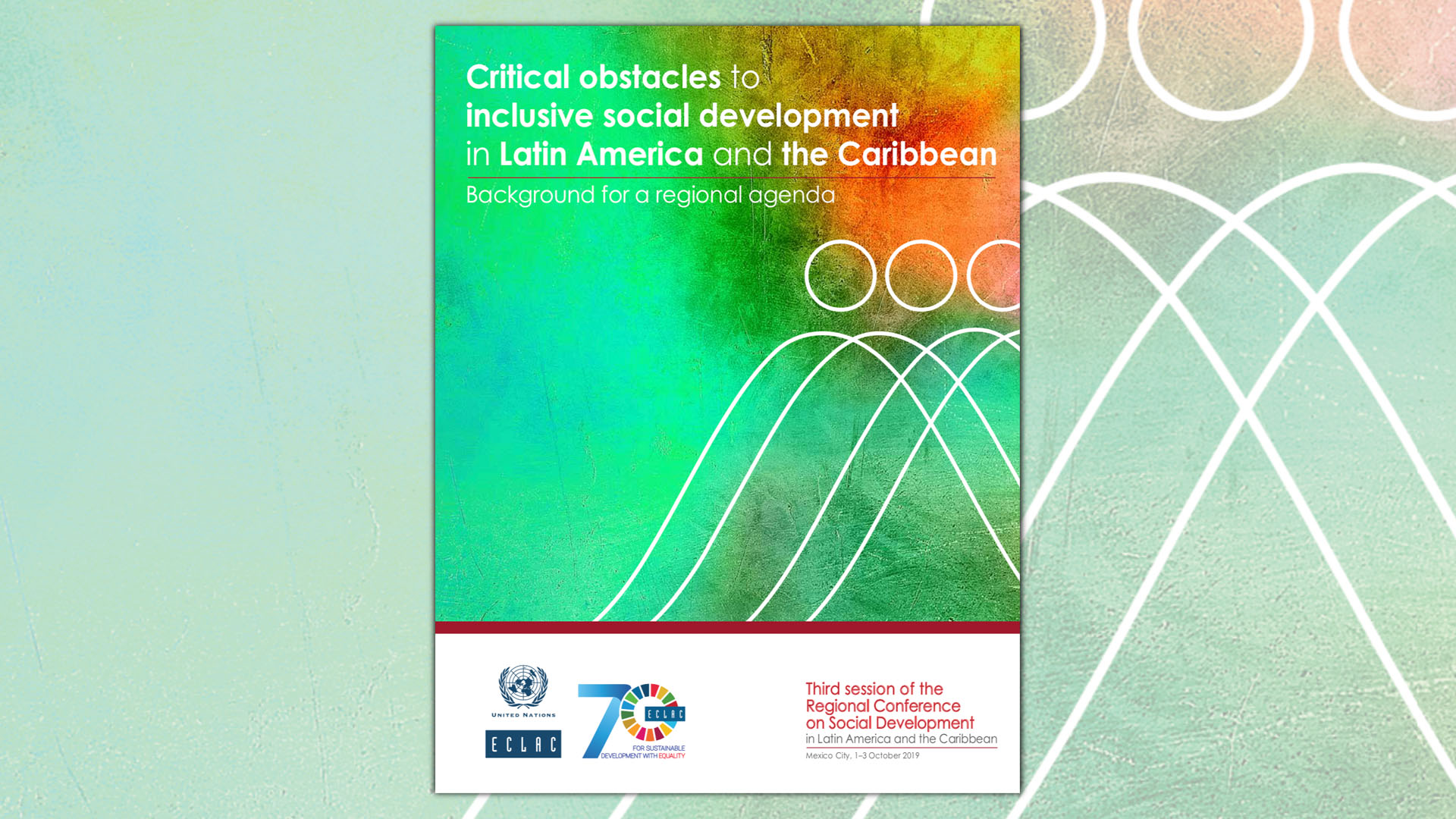Nueva generación de políticas de bienestar es necesaria para acelerar implementación de la Agenda 2030, señalan autoridades en apertura de conferencia regional
Work area(s)
The president of Mexico, Andrés Manuel López Obrador, led the inauguration of this event.

Mexico City, October 1, 2019. A new generation of social policies centered on rights and equality, along with stronger regional cooperation, are needed to accelerate the implementation of the social dimension of the 2030 Agenda for Sustainable Development, authorities and senior representatives agreed today during the inauguration in Mexico of the Third Meeting of the Regional Conference on Social Development in Latin America and the Caribbean.
At the National Palace, President Andrés Manuel López Obrador led the opening ceremony of this conference convened by the Economic Commission for Latin America and the Caribbean (ECLAC), the government of Mexico, and the United Nations Development Programme (UNDP). “I hope this gathering will transform into justice and equality for our peoples,” the Mexican leader stated upon officially inaugurating the event.
“In accordance with our reality, we are implementing a policy to eradicate corruption. If I am asked what the essence of our plan is, it is to put an end to corruption and impunity. In addition, we seek to carry out an austere government,” the Head of State explained. “The idea is that, with the fight against corruption as well as austerity, we can free up funds for the development and welfare” of the population.
Other participants in the opening session included Marcelo Ebrard, Secretary of Foreign Affairs of Mexico; María Luisa Albores, Secretary of Welfare of Mexico, who will assume the role of Chair of the Presiding Officers of the Regional Conference on Social Development; Marina Arismendi, Minister of Social Development of Uruguay, where the Second Meeting of the Conference was held in 2017; Alicia Bárcena, ECLAC’s Executive Secretary; and Luis Felipe López-Calva, the UNDP’s Regional Director for Latin America and the Caribbean.
“Mexico wants to welcome you, Mexico is looking southward, it wants to be an active party, resolute and committed to the causes of Latin America and the Caribbean,” Foreign Minister Marcelo Ebrard sustained during the ceremony.
Meanwhile, Minister Albores indicated that “we have accepted the Chair of this Conference because we are convinced that in order to achieve a decent life, with well-being and tranquility, for all Mexican women and men, we must adopt development models that put people at the center.” She further stated that “the region needs the demands for social justice to be heard, and governments to build welfare states.”
In her remarks, Uruguay’s Minister of Social Development, Marina Arismendi, emphasized that “when there is political determination, when there is conviction, when there is a commitment to social justice, substantial transformations can be achieved” in terms of social development. “We put our capacities, our cooperation, our research at the disposal of the region’s countries, and we will keep fighting for what ECLAC defines so well as ‘universalism that is sensitive to differences.’”
According to ECLAC’s most recent data, in 2017 there were 184 million people in situations of poverty in Latin America, equivalent to 30.2% of the population, of whom 62 million (10.2% of the population) found themselves in situations of extreme poverty. In addition, in 2016, 41.7% of people employed in Latin America received an income below the national minimum wage, with an especially high percentage seen among young women (60.3%).
“Now is the time to act. We must fuel and accelerate the implementation of the 2030 Agenda’s social dimension and fight the social footprint of the current development model in the region,” stressed ECLAC’s Executive Secretary, Alicia Bárcena, indicating that a key to this is the regional agenda for inclusive social development that will be presented and submitted for approval at the conference in Mexico. This agenda places emphasis on the need to promote social policies with a rights- and equality-based approach and guided by the principle of universalism sensitive to differences. It also underscores the importance of promoting dual social-and-labor inclusion, strengthening the social institutional framework, and bolstering multilateral action.
ECLAC notes with interest how Mexico has established 12 programs that cut across ministries, institutions and reach into distinct territories, Alicia Bárcena said. During the presentation of the document Critical obstacles to inclusive social development in Latin America and the Caribbean: Background for a regional agenda, she specified the four axes that make up the proposed regional agenda for inclusive social development: universal and comprehensive social protection systems; policies for social and labor inclusion; a strengthened social institutional framework; and regional cooperation and integration.
“The Sustainable Development Agenda, signed in 2015, is a manifestation and in some way a consolidation of the quest to have a global ideal and common aspirations. It gives us a shared horizon for public policy and reminds us that many of the challenges we face today can only be tackled through regional and global cooperation and coordination,” stated Luis Felipe López-Calva, the UNDP’s Regional Director.
In the framework of the Third Meeting of the Regional Conference on Social Development – which includes numerous thematic panels and side events and will be attended by representatives of civil society and United Nations organizations – the XI Ministerial Forum for Development in Latin America and the Caribbean will take place, organized by the UNDP.
More information:
- Document: Critical obstacles to inclusive social development in Latin America and the Caribbean: Background for a regional agenda.
- Conference website.
- Speech by ECLAC’s Executive Secretary (in Spanish).
- Presentation by ECLAC’s Executive Secretary of the document Critical obstacles to inclusive social development in Latin America and the Caribbean.
- Event program.
- Press registration.
- Live transmission.
Press contacts:
Secretariat of Welfare of the Government of Mexico - Cihuatl Zuñiga, Social Communications Coordinator, cihuatl.zunigan@bienestar.gob.mx, +5544754237.
ECLAC – Guido Camú, Chief of the Public Information Unit, prensa@cepal.org, +56 2 2210 2040 / +56 9 8 293 2602.
UNDP – Ana del Toro, ana.deltoro@undp.org, +52 1 5540912611 / Vanessa Hidalgo, vanessa.hidalgo@undp.org, +1 646 338 9462.
Related event
Related content

ECLAC Identifies At Least Eight Critical Obstacles that Hinder Inclusive Social Development in the Region
The United Nations regional organization presents a new study in the framework of the Third Meeting of the Regional Conference on Social Development in Latin America and the Caribbean, which will be…
A proposal for a regional agenda to address the critical obstacles to inclusive social development in Latin America and the Caribbean
Presentation by Alicia Bárcena, ECLAC Executive Secretary, in the Third Meeting of the Regional Conference on Social Development in Latin America and the Caribbean.
Inauguración de la Tercera Reunión de la Conferencia Regional sobre Desarrollo Social de América Latina y el Caribe
Palabras de Alicia Bárcena, Secretaria Ejecutiva de la CEPAL.
Subregional headquarter(s) and office(s)
Related link(s)
Country(ies)
- Latin America and the Caribbean
-
Mexico
Contact
Public Information Unit
- prensa@cepal.org
- (56 2) 2210 2040


